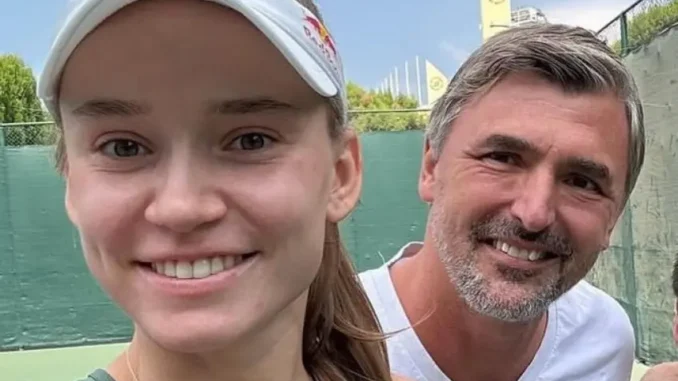
In the ever-shifting world of professional tennis, where alliances between players and coaches can shape careers, Goran Ivanisevic has finally broken his silence on the abrupt and enigmatic end to his coaching stint with Elena Rybakina. The Croatian tennis legend, a 2001 Wimbledon champion with a storied career both as a player and a coach, parted ways with the Kazakhstani star earlier this year after a brief collaboration that began with high hopes in late 2024. What started as a promising partnership dissolved into what Ivanisevic now calls a “sad and strange story,” confirming whispers that had swirled around the tennis community for months. His recent reflections, shared in a candid interview as the 2025 season heats up, peel back the curtain on a saga marked by off-court turbulence and unexpected twists.
Ivanisevic, whose coaching resume boasts transformative stints with Novak Djokovic and Marin Cilic, joined Rybakina’s camp during the off-season following her split with longtime coach Stefano Vukov in August 2024. The pairing seemed a natural fit—two Wimbledon winners, both known for their powerful games and cool-headed tenacity. “I consider her, even before I became her coach, to be the best tennis player in the world,” Ivanisevic said, his admiration for her elegant, commanding style shining through. He’d watched her from afar, marveling at how she played “the most beautifully, the simplest,” and leapt at the chance to guide her toward more Grand Slam glory. Their early days together showed promise; they trained in Dubai, competed at the United Cup, and headed into the Australian Open with momentum. But beneath the surface, storm clouds were brewing.
The unraveling began on New Year’s Day 2025, when Rybakina dropped a bombshell: Vukov, her coach of five years who’d steered her to the 2022 Wimbledon title, would return to her team. The announcement blindsided Ivanisevic, who was still in Melbourne coaching her at the season’s first Grand Slam. Complicating matters, Vukov was under a provisional WTA suspension stemming from an investigation into his conduct—a ban upheld after months of scrutiny, barring him from official tournament credentials. Rybakina, fiercely loyal, stood by Vukov, insisting he’d “never mistreated” her. Yet for Ivanisevic, the situation was untenable. “I won’t talk much about it, but I can say that it’s a bit of a sad and strange story,” he confessed, his voice tinged with regret. “Unfortunately, some things happened off the court that I couldn’t control, and I didn’t want to be a part of that.”
Those “things” remain shrouded in mystery, though speculation has run rampant. The tennis world buzzed with theories—some whispered of a deeper personal dynamic between Rybakina and Vukov, others pointed to the awkwardness of Ivanisevic being thrust into a coaching triangle he hadn’t signed up for. Whatever the truth, Ivanisevic’s discomfort was palpable. After Rybakina’s fourth-round exit at the Australian Open—a loss to Madison Keys, who’d go on to claim the title—he made his decision. “I didn’t want to be part of that story,” he said, opting to step away rather than navigate the murky waters of her team’s off-court drama. It was a quiet exit, announced with a simple social media post wishing her well, but it left fans and analysts reeling.
For Ivanisevic, the split wasn’t about Rybakina’s talent or potential. Even now, he holds her in the highest regard. “She plays the most beautifully,” he reiterated, a nod to the effortless power and grace that have made her a fan favorite. Their time together, though brief, included flashes of brilliance—semifinals at the United Cup, a solid start in Melbourne—but it couldn’t withstand the chaos swirling beyond the baseline. Since their parting, Rybakina has leaned on new coach Davide Sanguinetti while maintaining contact with Vukov, spotted training with him at private facilities despite his WTA ban. Her season has been a mixed bag—semifinals in the Middle East, a fourth-round exit at Indian Wells—suggesting she’s still searching for stability.
Ivanisevic, meanwhile, has returned to the sidelines, his coaching future uncertain but his legacy intact. His tenure with Djokovic yielded 12 Grand Slam titles, and his brief chapter with Rybakina, though unfinished, underscored his eye for greatness. “I wish her all the best in her career,” he said, a gracious farewell to a player he still believes could dominate the sport. For fans, the saga leaves lingering questions: What really happened behind closed doors? And can Rybakina reclaim her peak form amid the turbulence? As the clay season looms, her journey—and Ivanisevic’s candid revelations—keep the tennis world on edge, a reminder that in this game, the drama off the court can rival the battles on it.
Leave a Reply